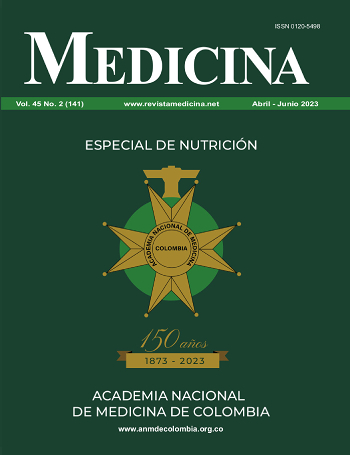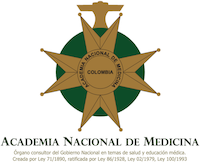Manejo quirúrgico y nutricional en enfermedades gastrointestinales
DOI:
https://doi.org/10.56050/01205498.2230Resumen
El soporte nutricional es de suma importancia en la cirugía digestiva, debido a que se interviene el tracto gastrointestinal (TGI) que es el que asegura la digestión y la reabsorción de los alimentos. El intestino delgado es el principal receptor de la absorción y cuando está sano garantiza la absorción de la mayor parte de los macronutrientes ingeridos, siempre que se mezcle con el jugo pancreato-duodenal que contiene las enzimas exocrinas. La porción sana del TGI indicará el tipo de soporte nutricional y
su función deberá estimularse mediante el uso de diferentes técnicas y la administración de fórmulas enterales de fácil digestión que favorezcan la eficacia de su utilización.
La función del intestino se ve comprometida por la alteración de la anatomía del intestino, la disminución de su actividad, la obstrucción inflamatoria e infecciosa y el reposo intestinal; en cuyo caso estaría indicada la nutrición parenteral.
Un último factor de interferencia es la presencia de sepsis generalizada o peritonitis, durante la cual fallan el peristaltismo, la digestión y la absorción. En esta situación, el tratamiento y el control de la infección son la prioridad. Una vez que esto se logra el soporte nutricional parenteral o enteral está indicado y la selección dependerá de la capacidad de absorción del intestino
restante.
Biografía del autor/a
Peter B. Soeters, Universidad de Maastricht, Holanda
Profesor Emérito de Cirugía Universidad de Maastricht Centro Médico Holanda
Referencias bibliográficas
Soeters PB, Reijven PL, van Bokhorst-de van der Schueren MA, Schols JM, Halfens RJ, Meijers JM, et al. A rational approach to nutritional assessment. Clin Nutr. 2008;27(5):706-16.
Moore FA, Moore EE, Read RA. Postinjury multiple organ failure: role of extrathoracic injury and sepsis in adult respiratory distress syndrome. New Horiz. 1993;1(4):538-49.
Kasperk R, Philipps B, Vahrmeyer M, Willis S, Schumpelick V. [Risk factors for anastomosis dehiscence after very deep colorectal and coloanal anastomosis]. Chirurg. 2000;71(11):1365-9.
Murphy TJ, Paterson HM, Kriynovich S, Zang Y, Kurt-Jones EA, Mannick JA, et al. Linking the “twohit” response following injury to enhanced TLR4 reactivity. 2005. p. 16-23.
Kaneko A, Kido T, Yamamoto M, Kase Y, Washizawa N, Aburada M, et al. Intestinal anastomosis surgery with no septic shock primes for a dysregulatory response to a second stimulus. J Surg Res. 2006;134(2):215-22.
Wu LR, Zaborina O, Zaborin A, Chang EB, Musch M, Holbrook C, et al. Surgical injury and metabolic stress enhance the virulence of the human opportunistic pathogen Pseudomonas aeruginosa. Surg Infect (Larchmt). 2005;6(2):185-95.
Wu L, Estrada O, Zaborina O, Bains M, Shen L, Kohler JE, et al. Recognition of host immune activation by Pseudomonas aeruginosa. Science. 2005;309(5735):774-7.
Rohrig G, Becker I, Polidori MC, Schulz RJ, Noreik M. Association of anemia and hypoalbuminemia in German geriatric inpatients : Relationship to nutritional status and comprehensive geriatric assessment. Z Gerontol Geriatr. 2015;48(7):619-24.
Bach V, Schruckmayer G, Sam I, Kemmler G, Stauder R. Prevalence and possible causes of anemia in the elderly: a cross-sectional analysis of a large European university hospital cohort. Clinical interventions in aging. 2014;9:1187-96.
Tartter PI. Immunologic effects of blood transfusion. Immunol Invest. 1995;24(1-2):277-88.
Golub R, Golub RW, Cantu R, Jr., Stein HD. A multivariate analysis of factors contributing to leakage of intestinal anastomoses. J Am Coll Surg. 1997;184(4):364-72.
Mynster T, Nielsen HJ. The impact of storage time of transfused blood on postoperative infectious complications in rectal cancer surgery. Danish RANX05 Colorectal Cancer Study Group. Scand J Gastroenterol. 2000;35(2):212-7.
Dellinger RP, Levy MM, Rhodes A, Annane D, Gerlach H, Opal SM, et al. Surviving sepsis campaign: international guidelines for management of severe sepsis and septic shock: 2012. Crit Care Med. 2013;41(2):580-637.
Leichtle SW, Mouawad NJ, Lampman R, Singal B, Cleary RK. Does preoperative anemia adversely affect colon and rectal surgery outcomes? J Am Coll Surg. 2011;212(2):187-94.
Munoz M, Gomez-Ramirez S, Martin-Montanez E, Auerbach M. Perioperative anemia management in colorectal cancer patients: a pragmatic approach. World J Gastroenterol. 2014;20(8):1972-85.
Sorensen LT, Jorgensen T, Kirkeby LT, Skovdal J, Vennits B, Wille-Jorgensen P. Smoking and alcohol abuse are major risk factors for anastomotic leakage in colorectal surgery. Br J Surg. 1999;86(7):927-31.
Coxib, traditional NTC, Bhala N, Emberson J, Merhi A, Abramson S, et al. Vascular and upper gastrointestinal effects of non-steroidal anti-inflammatory drugs: meta-analyses of individual participant data from randomised trials. Lancet. 2013;382(9894):769-79.
Gorissen KJ, Benning D, Berghmans T, Snoeijs MG, Sosef MN, Hulsewe KWE, et al. Risk of anastomotic leakage with non-steroidal anti-inflammatory drugs in colorectal surgery. British Journal of Surgery. 2012;99(5):721-7.
Rai R, Nagral S, Nagral A. Surgery in a Patient with Liver Disease. Journal of Clinical and Experimental Hepatology. 2012;2(3):238-46.
Iannuzzi JC, Deeb AP, Rickles AS, Sharma A, Fleming FJ, Monson JR. Recognizing risk: bowel resection in the chronic renal failure population. J Gastrointest Surg. 2013;17(1):188-94.
Bozzetti F, Gavazzi C, Miceli R, Rossi N, Mariani L, Cozzaglio L, et al. Perioperative total parenteral nutrition in malnourished, gastrointestinal cancer patients: a randomized, clinical trial. JPEN J Parenter Enteral Nutr. 2000;24(1):7-14.
Windsor JA, Hill GL. Weight loss with physiologic impairment. A basic indicator of surgical risk. Ann Surg. 1988;207(3):290-6.
Von Meyenfeldt MF, Meijerink WJ, Rouflart MM, Builmaassen MT, Soeters PB. Perioperative nutritional support: a randomised clinical trial. Clin Nutr. 1992;11(4):180-6.
Gianotti L, Braga M, Fortis C, Soldini L, Vignali A, Colombo S, et al. A prospective, randomized clinical trial on perioperative feeding with an arginine-, omega-3 fatty acid-, and RNA-enriched enteral diet: effect on host response and nutritional status. JPEN J Parenter Enteral Nutr. 1999;23(6):314-20.
Hegazi RA, Hustead DS, Evans DC. Preoperative Standard Oral Nutrition Supplements vs Immunonutrition: Results of a Systematic Review and Meta-Analysis. Journal of the American College of Surgeons. 2014;219(5):1078-87.
Moiniche S Bulow S, Hesselfedldt P, Hestbaek A, Kehlet H. Convalescence and hospital stay after colonic surgery with balanced analgesia, early oral feeding, and enforced mobilisation. Eur J Surg.1995; 161(4):283-8.
Sayama K, Imagawa A, Okita K, Uno S, Moriwaki M, Kozawa J, et al. Pancreatic beta and alpha cells are both decreased in patients with fulminant type 1 diabetes: a morphometrical assessment. Diabetologia. 2005;48(8):1560-4.
Linder MM, Wacha H, Feldmann U, Wesch G, Streifensand RA, Gundlach E. [The Mannheim peritonitis index. An instrument for the intraoperative prognosis of peritonitis]. Chirurg. 1987;58(2):84-92
Visschers RG, van Gemert WG, Winkens B, Soeters PB, Olde Damink SW. Guided treatment improves outcome of patients with enterocutaneous fistulas. World J Surg. 2012;36(10):2341-8.
Visschers RG, Olde Damink SW, Winkens B, Soeters PB, van Gemert WG. Treatment strategies in 135 consecutive patients with enterocutaneous fistulas. World J Surg. 2008;32(3):445-53.
Fearon KC, Ljungqvist O, Von Meyenfeldt M, Revhaug A, Dejong CH, Lassen K, et al. Enhanced recovery after surgery: a consensus review of clinical care for patients undergoing colonic resection. Clin Nutr. 2005;24(3):466-77.
Soeters PB, Shenkin A, Sobotka L, Soeters MR, de Leeuw PW, Wolfe RR. The anabolic role of the Warburg, Cori-cycle and Crabtree effects in health and disease. Clin Nutr. 2021;40(5):2988-98.
Spanjersberg WR, van Sambeeck JD, Bremers A, Rosman C, van Laarhoven CJ. Systematic review and meta-analysis for laparoscopic versus open colon surgery with or without an ERAS programme. Surg Endosc. 2015.
Lobo DN, Bostock KA, Neal KR, Perkins AC, Rowlands BJ, Allison SP. Effect of salt and water balance on recovery of gastrointestinal function after elective colonic resection: a randomised controlled trial. Lancet. 2002;359(9320):1812-8.
Soeters PB, Grimble RF. Dangers, and benefits of the cytokine mediated response to injury and infection. Clin Nutr. 2009;28(6):583-96.
Soeters, Peter B, de Leeuw, Peter W. Reciprocal Translation Between Pathophysiology and Practice in Health and Disease 1: Academic Press; 2021 p, 281-291.
Soeters PB, Grimble RF. The conditional role of inflammation in pregnancy and cancer. Clin Nutr. 2013;32(3):460-5.
Makishima M, Okamoto AY, Repa JJ, Tu H, Learned RM, Luk A, et al. Identification of a nuclear receptor for bile acids. Science. 1999;284(5418):1362-5.
Modica S, Petruzzelli M, Bellafante E, Murzilli S, Salvatore L, Celli N, et al. Selective activation of nuclear bile acid receptor FXR in the intestine protects mice against cholestasis. Gastroenterology. 2012;142(2):355-65 e1-4.
Rinsema W, Gouma DJ, von Meyenfeldt MF, Soeters PB. Reinfusion of secretions from high-output proximal stomas or fistulas. Surg Gynecol Obstet. 1988;167(5):372-6.
Lefebvre P, Cariou B, Lien F, Kuipers F, Staels B. Role of bile acids and bile acid receptors in metabolic regulation. Physiol Rev. 2009;89(1):147-91.
Luyer MD, Greve JW, Hadfoune M, Jacobs JA, Dejong CH, Buurman WA. Nutritional stimulation of cholecystokinin receptors inhibits inflammation via the vagus nerve. J Exp Med. 2005;202(8):1023-9.
Colomb V, Jobert-Giraud A, Lacaille F, Goulet O, Fournet JC, Ricour C. Role of lipid emulsions in cholestasis associated with long-term parenteral nutrition in children. JPEN J Parenter Enteral Nutr. 2000;24(6):345-50.
Visschers RG, Olde Damink SW, Gehlen JM, Winkens B, Soeters PB, van Gemert WG. Treatment of hypertriglyceridemia in patients receiving parenteral nutrition. JPEN J Parenter Enteral Nutr. 2011;35(5):610-5.
Cómo citar
Descargas
Publicado
Número
Sección
Licencia
Derechos de autor 2023 Medicina

Esta obra está bajo una licencia internacional Creative Commons Atribución-NoComercial-SinDerivadas 4.0.
Copyright
ANM de Colombia
Los autores deben declarar revisión, validación y aprobación para publicación del manuscrito, además de la cesión de los derechos patrimoniales de publicación, mediante un documento que debe ser enviado antes de la aparición del escrito. Puede solicitar el formato a través del correo revistamedicina@anmdecolombia.org.co o descargarlo directamente Documento Garantías y cesión de derechos.docx
Copyright
ANM de Colombia
Authors must state that they reviewed, validated and approved the manuscript's publication. Moreover, they must sign a model release that should be sent.

| Estadísticas de artículo | |
|---|---|
| Vistas de resúmenes | |
| Vistas de PDF | |
| Descargas de PDF | |
| Vistas de HTML | |
| Otras vistas | |




